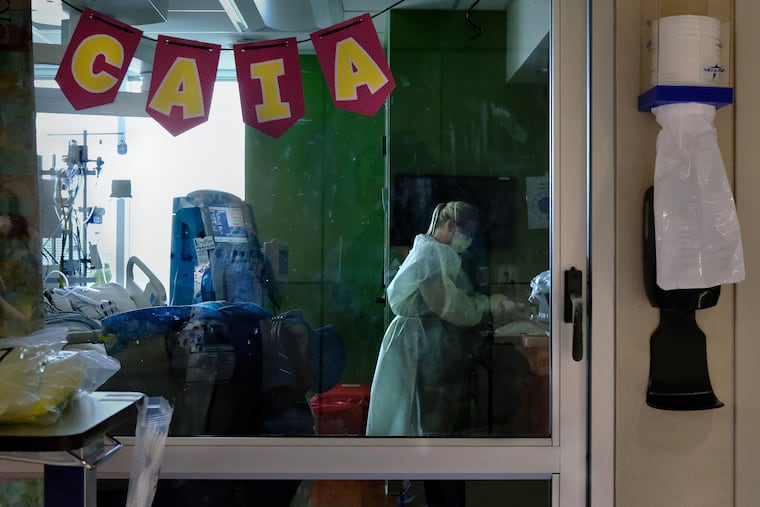Parents would do anything for their kids. A Philly pediatrician has one more suggestion. | Expert Opinion
Some believe the vaccine is a matter of individual choice. But it isn’t for those too young to protect themselves, or for those facing hospitals that are too overwhelmed to care for them.

When I entered the examining room, my young patient was giggling with infectious energy as his grandmother gently tickled him. The loving bond they shared was deep and moving, even to a near stranger.
I sat down and asked the grandmother what questions she had about her grandson’s health. Her smile dimmed as she told me she was terrified to send him back to school.
In just the past year, he had landed in the emergency room on four separate occasions for difficulty breathing as his asthma flared. She worried about him contracting COVID-19 when he returned to school. She wanted to know what she could do to protect him.
As we reviewed his asthma care plan and the evidence supporting masking, she took careful notes. Yet, when I asked her if she had been vaccinated against COVID-19, she stiffened and looked away. She told me she had no intention of getting the vaccine and was not interested in discussing it further.
This felt all too familiar. Many families in our practice have chosen not to get the vaccine for themselves or their eligible children over age 12. I have been alarmed by how much of this hesitancy stems from misinformation spread through social media and elected officials, all without scientific backing.
Parents have told me they don’t see a point in getting vaccinated, since they believe COVID-19 will not cause them serious illness. They worry the vaccine is too new, or will come with side effects.
Even when their child is in our hospital with COVID-19 complications, parents have told me all this.
Some believe the vaccine is a matter of individual choice. But it isn’t.
Most of my patients are too young to get the vaccine and must count on those around them to protect them. They don’t get a choice.
As cases rise, our health care systems are once again being overwhelmed. In San Antonio, demand for EMS was so high that at one point there were no ambulances available. Last Friday in Dallas, there were no pediatric ICU beds available city wide. On Wednesday in Alabama, there were no ICU beds in the entire state.
Philadelphia has not been hit quite as hard as other parts of the U.S. so far, but spread will likely accelerate once schools open. We may suffer the same shortages we are seeing elsewhere, and that would impact all children coming to the hospital. Again, they don’t get a choice.
The pandemic has truly become one of the unvaccinated, with over 95% of new cases nationwide occurring among unvaccinated individuals. Last month, in Pennsylvania, 97% of hospitalized patients were unvaccinated, making up 99% of all COVID-related deaths.
My young patient’s grandmother wasn’t impressed by me spouting statistics about the vaccine’s efficacy, or highlighting the fact that side effects, when they occur, are mostly minor and short-lived. Nor was she all that swayed by my acknowledgement that yes, breakthrough infections do occur in the vaccinated, but they are far less serious than what unvaccinated people face. She had heard this speech before.
Here’s what changed everything for her: centering the discussion on her grandson and his safety.
Nothing was more important to her, she told me, promising she would talk to her doctor about the vaccine and that she will likely get it -- to protect him.
I hope I helped her. I know she helped me change the conversation I have with parents. It is our job as pediatricians to show parents how getting vaccinated against COVID can be a protective act of love for their child.
» READ MORE: Please get vaccinated. We owe it to the exhausted doctors and nurses who deserve a break. | Opinion
We will continue to do all we can to care for your children. But we need your help. If your child is 12 or older, the vaccine is safe and effective, and trials for younger children are underway. In the meantime, the best protection for our unvaccinated youth involves masking and vaccination of those around them who are eligible. I encourage you to consult trustworthy sources such as the CDC, the Children’s Hospital of Philadelphia’s Vaccine Education Center, your own physician, or your child’s pediatrician.
Ultimately, I hope you choose to protect yourself; it’s the best thing you can do to protect the ones you love most.
Jeremy Jones, MD is a pediatrics resident physician in Philadelphia.